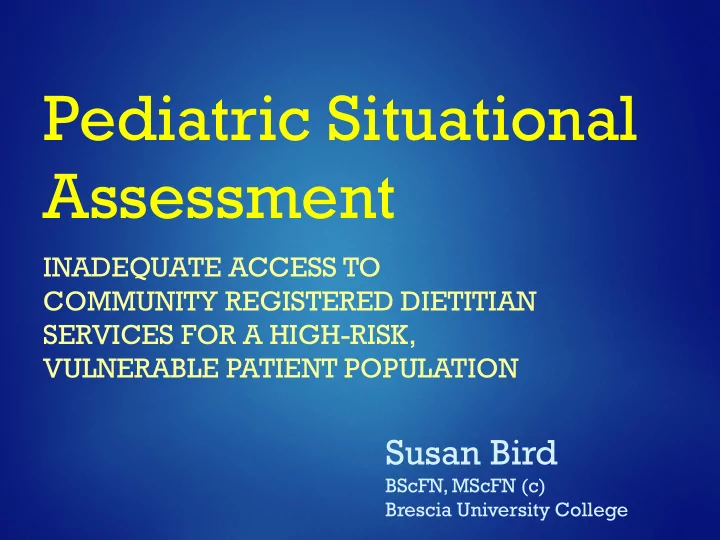

Pediatric Situational Assessment INADEQUATE ACCESS TO COMMUNITY REGISTERED DIETITIAN SERVICES FOR A HIGH-RISK, VULNERABLE PATIENT POPULATION Susan Bird BScFN, MScFN (c) Brescia University College
Pediatric Situational Assessment COLLABORATORS: DR. COLLEEN O’CONNOR PhD, RD DR. JANET MADILL PhD, RD CATHY VERKLEY BSc, HEc, RD
3 Research Initiative Community feeding group Children’s Aid Society of London Middlesex Southwest Community Care Access Centre Development Follow-up Clinic ( Children’s Hospital LHSC) Grey-Bruce Integrated Preschool Speech and Language Program Home Visiting Program for Infants (Child Parent Resource Institute) Middlesex London Health Unit Smalltalk (Huron Perth Preschool Speech & Language Initiative) Tyke Talk (Thames Valley Preschool Speech & Language Initiative) Thames Valley Children’s Centre
Research Initiative Community feeding group Specifically concerned with pediatric patients (0-5 yrs) with feeding & nutrition issues Pediatric patients were being referred to community registered dietitians by: Agencies that deal with children In-hospital registered dietitians Physicians outside of family health teams Pediatricians Referrals were being rejected “Just documenting the obvious” 4
Project Innovation Opportunity to conduct an unique exploratory study Partnership between community & academia Literature review revealed: Many studies evaluating nutritional needs (Stanislavskaia J. 2014) (Williams S. et al. 2006)(Sharp WG. et al. 2010) Interdisciplinary focus - includes registered dietitians ( Keith-Thomas A. et al 2007)(Williams et al. 2006) Only study tracked accessibility to dietetic support – hospital setting (Larsen BM et al. 2014) 5
Project Innovation GAP in scientific research Leaving a high risk vulnerable population without access to dietetic care 6
Research Initiative Pediatric Situational Assessment Quantify the gap Patients able to access and those who were rejected Identify areas of most frequent nutritional concern Provide qualitative information regarding accessibility concerns & the impact on health of patient Document accessibility barriers Goal: improve health care for pediatric population by increasing the access to community registered dietitians 7
Improving Patient Health in SW Ontario Poor childhood nutrition = acute & chronic health consequences Growth retardation Developmental & psychological deficits Poor academic achievement Social difficulties Chronic respiratory disease Prolonged use of enteral or parenteral feedings Malnutrition Death (Miller CK. et al. 2001)(Linscheid T. 2006)(May AL. et al. 2010) (Sharp WG. et al. 2010) Ensuring access to dietetic support = patient health 8
Improving Patient Health in SW Ontario Register Dietitians make a Difference using evidenced based practice Assess macro/micro nutrient needs calories, protein, carbohydrate, fat, & fluid Anthropometric, biochemistry, clinical & dietary Recommend age appropriate nutrition - specific to disease state behavioural and SES issues Nutrition care plan with appropriate foods and textures Liaison with interdisciplinary team 9
Research & Community Practice Collaboration by community members Pediatricians Health Care Agencies OT, PT, SLP In-hospital registered dietitians Family members Community Care Access Center Community effort required - quantify the problem, identify the barriers & improve health care provided 10
Study Design Methodology: quantitative & qualitative tools Physicians Caregivers & Agencies Questionnaire Data Collection Focus Group Referral to Successful Community RD Referral 11
Timeline 12
Dissemination of Information Results presented to South West Local Health Integration Network (LHIN) LHIN: “provides an integrated health care system that identifies priorities & find solutions which are based on local needs” (South West LHIN, 2014) Public Health Nutrition Journal Community feeding group & CCAC 13
Opportunities for Research Activities Collaboration between academia and community members on an identified priority need Increase knowledge across health disciplines Generate information and build partnerships to advocate for improved patient health Knowledge Transfer 14
Thank You DISCUSSION & QUESTIONS
References Keith-Thomas A, Barresi I. Feeding Disorders in Children: Taking an Interdisciplinary Approach. Pediatr Ann. 2007 Aug;36(8):478 – 83. Linscheid T. Behavioral Treatments for Pediatric Feeding Disorders. Behav Modif. 2006 Jan 1;30(1):6 – 23. May AL, Dietz WH. The Feeding Infants and Toddlers Study 2008: Opportunities to Assess Parental, Cultural, and Environmental Influences on Dietary Behaviors and Obesity Prevention among Young Children. J Am Diet Assoc. 2010 Dec;110(12, Supplement):S11 – 5. Miller CK. An Interdisciplinary Team Approach to the Management of Pediatric Feeding and Swallowing Disorders. Child Health Care. 2001 Sep 1;30(3):201 – 18. Sharp WG, Jaquess DL, Morton JF, Herzinger CV . Pediatric feeding disorders: a quantitative synthesis of treatment outcomes. Clin Child Fam Psychol Rev. 2010 Dec;13(4):348 – 65. Stanislavskaia J. Behavioral Feeding Problems of Normally Developing Children Under 4 Years of Age. Univ West Ont - Electron Thesis Diss Repos [Internet]. 2014 Aug 7; Available from: http://ir.lib.uwo.ca/etd/2331 South West LHIN. 2014 15 Priorities for Investment Communique 2 [Internet]. 2014 [cited 2014 Oct 6]. Available from: http://www.southwestlhin.on.ca/~/media/sites/sw/uploadedfiles/HSPs/2014%2015%20PFI%20Communi que2%202014Sept.pdf Williams S, Witherspoon K, Kavsak P, Patterson C, McBlain J. Pediatric Feeding and Swallowing Problems: An Interdisciplinary Team Approach. Can J Diet Pract Res. 2006 Winter;67(4):185 – 90.
Recommend
More recommend